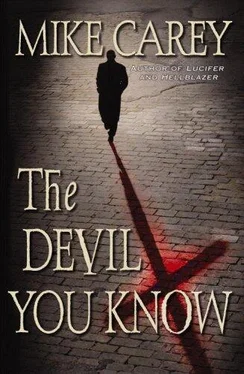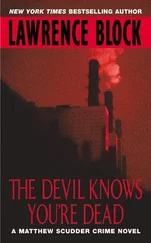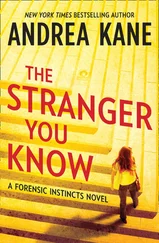A glass of whisky was calling out to me, a sultry siren song floating above the hoarse and ragged voices of the night.
But I was like Ulysses, tied to the mast.
First I had to go and see Rafi.
I changed my clothes in the car, experiencing a palpable prickle of relief as I dumped the green dinner jacket in the backseat. It wasn’t the ridiculous color of the thing, it was the feeling of being without my tin whistle, as necessary to me as a piece is to an American private eye. As I shrugged my greatcoat back on over my shoulders—hard work in that confined space—I had to reassure myself that the whistle was still there, in the long, sewn-in pocket on the right-hand side at chest height, where I can hook it out with my left hand while it looks like I’m just checking my watch. The dagger and the silver cup are useful tools in their way, but the whistle is more like a part of me—an extra limb.
It’s a Clarke Original, key of D, with hand-painted diamonds around the stops and the sweetest chiff I ever came across. It comes in a C, too, but like David St. Hubbins once said, “D is the saddest chord.” I feel at home there.
Satisfied that the whistle was back where it was meant to be, I started the car and drove away from the office with the familiar mixed feelings of relief and cold-turkey disgruntlement.
The Charles Stanger Care Facility is a discreet little place about a third of the way down the long bow bend of Coppetts Road, just off the North Circular. The spine of it was made by knocking a whole row of workers’ cottages together into one building, and although there are some odd, misshapen limbs growing off that spine now, with Coldfall Wood as its backdrop the place still manages to look idyllic if you approach it on a summer’s day—and if you can ignore the colonnade of spavined bed frames and dead fridges left along the margins of the lane in the venerable English pastime of fly-tipping.
But a wet November evening shows the place off in a bleaker light, and once you get through the entrance door, which is actually two doors and can only be released by buzzer from the inside, you have to dump what’s left of the idyll in the receptacle provided. Pain and madness seem to be stewed into the walls of the place like stale sweat, and there’s always someone crying or someone cursing at the limit of hearing. For me, it’s as though I’m walking out of sunlight into shadow, even though they keep the heating turned up a degree or two too warm. I don’t know how far that’s down to me being what I am and how far it’s purely autosuggestion.
Charles Stanger was a paranoid schizophrenic who murdered three children in one of those workers’ cottages just after the Second World War. The books say two, but it was three—I’ve met them. He spent the rest of his life in Broadmoor at Her Majesty’s pleasure, and in his more lucid stretches—because Charlie was Cambridge-educated and could turn a sentence like a joiner turns a table leg—he wrote eloquent letters to the Home Secretary, the president of the Howard League for Penal Reform, and anyone else who showed an interest, bewailing the lack of adequate facilities for the long-term incarceration of those whose crimes were occasioned not by malice or deviant passion but purely and simply by their being as crazy as shithouse rats.
After he died, it was discovered that he owned not just the cottage he lived in but the one next door, too. His will stipulated that they should be given over to a trust in the hope that they might someday become the seed and template for a more humane and less alienating institution in which the dangerously disturbed could live out their days safely sequestered from ordinary punters.
It’s quite a touching story, really. A bit sad for the three little ghosts, of course, because they’re now spending the afterlife in the company of an endless stream of violently disturbed men who probably bring back to them the circumstances of their own demise. But the dead have no rights. The mentally ill do, at least on paper, and the Charles Stanger Care Facility walks the usual line between respecting those rights and trimming the edges of them. Mostly the inmates are treated pretty well, unless they cut up rough with the wrong attendant at the wrong time. The place had only had four deaths in care in the last twenty years, and only one that could fairly be called suspicious. I would have liked to have met him , too, but he hadn’t stuck around.
The Stanger doesn’t pin its faith to last April’s rowan switch, and if you’ve ever seen the effect a haunting can have on the psychologically fractured or fragile, you’ll know why. The wards here are maintained on a week-by-week basis, and they come in all three flavors: a cross and a mezuzah, representing the religious worldview, a sprig of pagan woodbine, and a necromantic circle meticulously drawn around the words HOC FUGERE—flee this place.
The staff nurse at the reception desk looked up as I walked in and gave me a warm smile. Carla. She’s an old hand, and she knows why I have strolling-in-off-the-street privileges here.
“Evening, lover,” she said. That’s her usual form of address for me, but she knows I won’t get the wrong idea; her husband, Jason, is a burly male nurse and could make a novel origami sculpture out of me in the space of about five seconds. “I thought he’d been pretty good lately.”
“He’s been fine, Carla,” I said, scribbling my name in the daybook. “Tonight I’m just visiting. He wrote me a letter.”
Her eyes widened, and interest quickened on her face. Carla is an inveterate gossip. It’s her only vice, and she regrets bitterly the failure of real-life hospitals to live up to the same standards of intrigue and promiscuity as fictional ones.
“Yeah, I saw,” she said, leaning in toward me a little. “He had a hard time with it, too. You know, the strong hand writing, the other one trying to snatch the paper away.”
I raised and lowered my eyebrows in a virtual shrug. “Asmodeus won,” I said tersely, and Carla made a sour face. Asmodeus always wins. It wasn’t even worth commenting on anymore, and I’d only said it to avoid giving any other answer to her implied question.
“I’m going to go on in,” I said. “If Dr. Webb wants to talk to me, I can stick around for a while afterward. But really this one is just private stuff.”
“You run with it, Felix,” she said, waving me on. “Paul’s got the keys.”
Paul was a lugubrious black man so tall and broad that in a 4-4-2 formation, he’d count as one of the 4s all by himself. He scarcely ever spoke, and when he did, he kept it short and to the point. When he saw me walking up the corridor toward him, he said the single word “Ditko,” and I nodded. He turned around and led the way.
There’s a left turn at the end of the main hallway with a subtle upward gradient underfoot as you pass from the converted cottages into a newer, purpose-built wing. It has a different feel to it, too—on a psychic level, I mean. Old stones put out a sort of constant, diffuse emotional field like the glow of a dead fire; newly poured concrete is blank and cold.
Which may be why I shuddered when we stopped in front of Rafi’s door.
Paul bent down to check the inspection window, made a tutting sound with his tongue against his teeth. Then he put the key in the lock and turned it. The door swung open.
I always forget in between visits how small and bare Rafi’s cell is. I suppose forgetting makes the whole thing easier to bear. The place is a cube, essentially, ten feet on a side. No furniture, because even when it’s bolted down, Rafi can rip it up and use it, and there are people still working at the Stanger now who remember the last time that happened. “If in doubt, don’t,” is their fervent creed. The walls and ceiling are bare white plaster, but out of sight underneath them, instead of plasterboard, there’s a layer of silver and steel amalgam, one part to ten. Don’t ask me how much that cost. It’s the main reason why I’m poor. On the floor, the metal isn’t even covered over. It shines dully up from between old scuff marks.
Читать дальше











